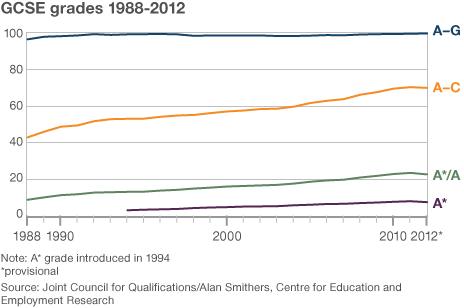Exams watchdog sounds note of caution on GCSE changes
- Published

Ofqual says it will decide whether of not the timetable for change is achievable
Reforms to examinations for 16-year-olds must be "thought through carefully", the exams watchdog for England has warned the government.
The warning comes after Education Secretary Michael Gove announced GCSEs in England would be replaced by an English Baccalaureate Certificate.
In a letter to the government, Ofqual says it will advise on whether the timetable for change is achievable.
The first EBC exams, in English, maths and sciences, will be sat in 2017.
Under the changes, now being put out to consultation, pupils starting English, maths and science courses in 2015 will be studying for the English Baccalaureate Certificate or EBCs.
These three core subject areas will be extended later to include history, geography and languages.
Education Secretary Michael Gove: “Today marks the next stage in radical exam reform”
In her letter to the Department for Education, external (DfE), Ofqual chief Glenys Stacey says standards must remain the top priority, with exam boards and schools having a "good enough understanding of what is expected".
She adds: "We will advise government on the timetable for change, and say if it is not achievable or if the risks to standards or delivery are unacceptable.
"We know from recent experience that reforms to qualifications need to be thought through carefully (we will report on our findings in relation to GCSE English qualifications next month).
"We will wish to identify the delivery pressure points in the reform of GCSEs, and intervene if we need to in order to manage any unacceptable risks."
Many GCSEs remain
Under Mr Gove's plans, GCSEs in all subjects will still be sat by four year groups of pupils until 2016 (the current Years 8, 9, 10 and 11).
Furthermore, many GCSEs will continue to be sat after 2017, as the EBCs will only cover core subjects to begin with.
This means, for example, an 11-year-old today will still sit some GCSEs in non-core subjects such as drama or computer studies, alongside EBCs.
In her letter, Ms Stacey stresses the need to uphold GCSE standards.

"Given that the proposed reforms will take time, we will continue to strengthen existing GCSEs," she says.
"It is important for all students that GCSEs are the best qualifications that they can be, now and for the future."
Brian Lightman, general secretary of the Association of School and College Leaders said there were lots of questions to answer about the new EBC qualification.
"The challenge is to shape these proposals into something more concrete. What they set out at the moment is a skeleton of a structure.
"A lot of work needs to take place to establish what this qualification is going to look like and what it's testing."
Mr Lightman said those pupils who would be taking GCSEs over the next four years must not be neglected.
"There are a whole raft of questions about the interim period, which is going to have to be carefully managed.
"Qualifications for the next four years have to be of a high standard - we can't just look four years ahead, we must also stay focussed on the here and now.
A Durham University expert has also called for more discussion on examination systems before the government introduces changes.
Prof Robert Coe, director of the Centre for Evaluation and Monitoring, said: "It is not obvious how the new qualification will be different from GCSEs.
"Of course you can give it a new name and say it will be rigorous and be like the O-levels were, but what does this mean?"
- Published18 September 2012
- Published17 September 2012
- Published17 September 2012
- Published17 September 2012
- Published7 February 2013
- Published16 September 2012